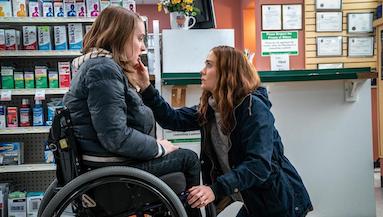|
|
Movie Review: RunBy Matthew HuntleyNovember 26, 2020
One day, Chloe, wanting to know if she’s received a college acceptance letter, goes snooping and discovers the name on the prescription bottle for one of her new pills is actually Diane’s. “Oh that’s just the receipt,” Diane explains. But Chloe isn’t sold, especially when this coincides with other odd happenings, such as the internet suddenly going down and Chloe being unable to research her medication online. She manages to investigate in other ways and takes more drastic measures to find out exactly what her mother is up to, and soon enough “Run” turns into a milder, less thoughtful version of “Whatever Happened to Baby Jane?” or “Misery.” Most of the movie’s problems exists at the screenplay level rather than the performance level. Chaganty penned the script with Sev Ohanian, whom he also partnered with on “Searching,” and it takes too long to suggest Diane’s motivation for tormenting her daughter. Altogether, the film only runs about an hour and 25 minutes (without the closing credits), and it wasn’t until the two-thirds mark that I started to understand why Diane would commit such reprehensible and abusive acts toward someone she supposedly loves. Still then, it’s not exactly clear why Diane behaves so harshly and maniacally. The film doesn’t bother exploring her inner turmoil, her pain, or her sadness to any substantive degree. We feel the same about Chloe, who otherwise earns our sympathy, and the result is our only mostly seeing both characters in terms of thriller archetypes, with Diane as the overreaching antagonist and Chloe as the hapless victim. We only gain a soft sense of them as actual people, although even this gets diluted when Chloe comes across the incriminating evidence I mentioned earlier. Would Diane really be so absent-minded as to lock Chloe, over whom she wants to maintain complete control, in the same room as all the documentation that more or less confirms Diane’s guilt and past criminal behavior? I just didn’t buy she’d be so careless and that Chloe would just happen to find it. Despite being silly and unconvincing, as just a serviceable, attention-holding thriller, “Run” is not very well made. The routine devices Chaganty and his crew employ to stir and unsettle the audience only go so far before we start to anticipate them well ahead of time, which weakens the surprise factor. Things like rack focusing in on the evil character, who’s spying from a distance; a gullible supporting character we suspect is just a victim-to-be; the series of physical challenges Chloe must overcome before Diane catches her; and the deliberate stalling of obvious explanations to other characters, which are meant to make us tense but actually frustrate us because we know smart people are being instructed to act clueless. In the end, “Run” is more puzzling than anything else. However, it’s not because the story and characters leave us wondering about the events that transpired and we want to talk about them with other viewers. Rather, it’s because the filmmakers have us questioning how they could have gotten so many things wrong. When you place “Searching” and “Run” side by side, they have a lot in common: both are about a desperate parent willing to take extreme measures to protect, or in this case, control, his or her child; both are about how technology plays a vital role in keeping track of other people; and both are about the disquieting feeling we get upon learning a shocking truth about someone we thought we knew. And while I know “Searching” and “Run” are very different when it comes to the plot details, it’s still interesting that two movies with such similar themes, and directed by the same filmmaker, could render such different results. Whereas “Searching” was credible, thrilling and stylistically original, “Run” is comparatively dull and inconsequential. Funnily enough, its title actually serves as instruction to the audience when considering watching it.
|

|
|
|

|
Thursday, October 31, 2024
© 2024 Box Office Prophets, a division of One Of Us, Inc.


